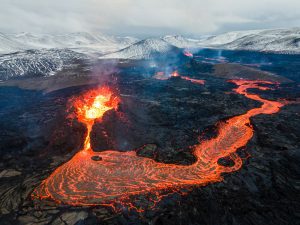As the world’s second-largest continent, situated between 37° north and 34° south, Africa’s seasons and impressive temperature changes make it the hottest continent on Earth.
Temperature and Season Changes
Temperatures are typically high throughout every season, in most parts of Africa. The continent’s dry and rainy seasons are different from one part of the continent to another. They may not seem so drastic in Africa’s temperate climate, but, the closer you get to the tropics the more visible these season changes become.
The dry season typically lasts around 6 months in many African countries. Some only see rainfall up to 3 months per year, with an extremely short rainy season; the arid weather impacts the way of life of the locals. Madagascar is the exception, with winds blowing from the East – making it one of the only African countries to see a bit more rainfall each year.
A Mediterranean climate can be seen along its Northern shores and the Southern tip. This climate is characterized by warm summers and damp winters, and is the closest to a temperate continental climate that Africa has. Compared to many other parts of the world, the temperature is still warmer than usual.
Why is Africa the hottest continent on Earth?
Africa’s temperature is largely influenced by the Congo Basic and the Sahara desert. Most days of the year have a temperature of over 20 degrees Celsius/68 degrees Fahrenheit.
Movement of air masses influences Africa’s high temperatures as well. The large size of the Sahara desert affects the temperature in central and northern countries, such as Morocco and Egypt, while the Congo Basic air movement affects the temperature in the Southern part of the continent.
Does the hot climate have a negative impact on Africa?
Aside from the high temperatures, there are multiple reasons for concern, including:
- Low rainfall statistics.
- Accentuated climate change
- Increase of insects and diseases resulting from the low yearly rainfall.
The low amount of natural rainwater equates to poor agricultural yields and animal growth. Without water, agriculture becomes nearly impossible in many parts of the continent. Extreme changes such as periods of hot weather followed by heavy rainfall aren’t beneficial to crops either.
Still, Africa is one of the most fascinating continents on Earth. Africa’s weather influences the lives of its people most of all, and it is sure to remain the hottest continent on Earth for centuries.

















